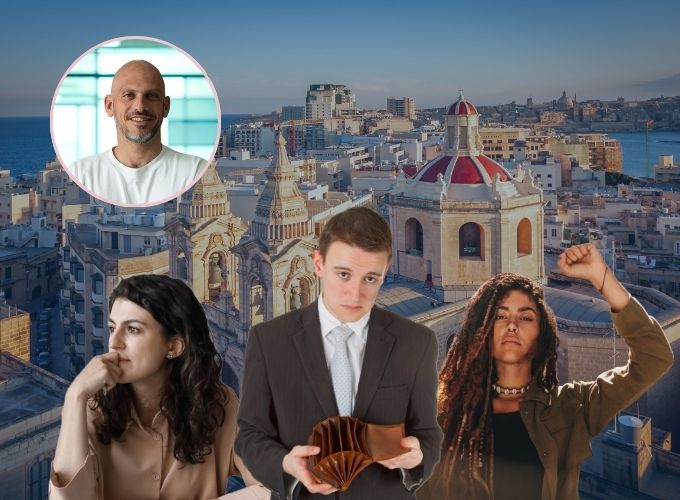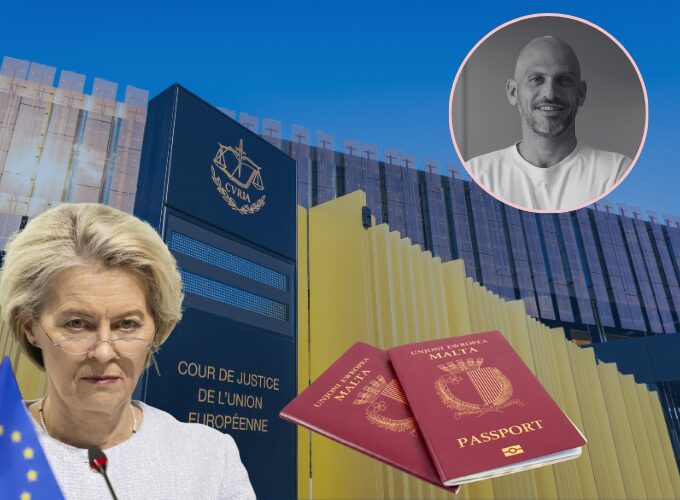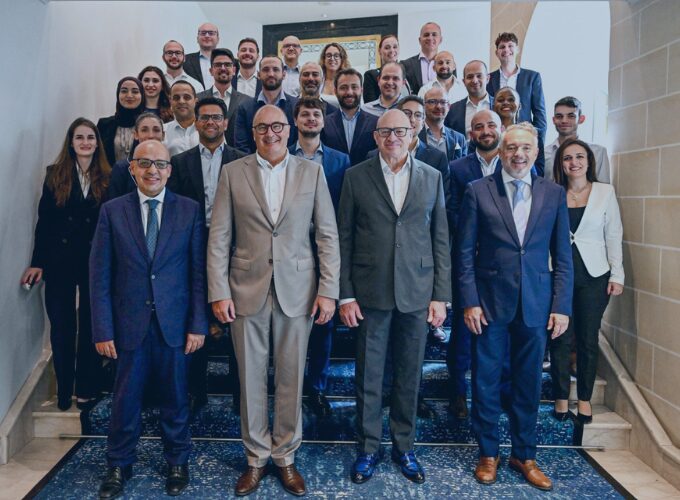Yannick Pace
So, the European Court of Justice has spoken. Malta broke EU law by selling passports. It violated the spirit of cooperation. It commercialised EU citizenship. It made a mockery of what it means to be European.
Let me be clear from the start: this was the wrong decision. It was a political act dressed up in legalese, driven by pressure, optics, and the need to make an example of a small country that stepped out of line. It was not justice — it was bullying, plain and simple.
That said, Malta made it easy. The case wasn’t brought in a vacuum. It landed at a time when Malta’s reputation had hit rock bottom. Then-Prime Minister Joseph Muscat had just been forced to resign. His administration had become synonymous with the Panama Papers and eventually the assassination of Daphne Caruana Galizia, which sent shockwaves across Europe and made Malta a byword for impunity.
European institutions were alarmed. Public trust in the Maltese state was crumbling. And when the Commission looked for examples of systemic failure, the Individual Investor Programme — already controversial — became an easy target. In the years that followed, Malta would be greylisted by the Financial Action Task Force.
The country had lost the benefit of the doubt, and it gave the Commission all the ammunition it needed to act. We didn’t just open the door — we left it swinging.
But here’s the thing: the real crime, in the Commission’s eyes, wasn’t the IIP itself. It was that Malta dared to run it openly — and on its own terms.
A Crime of Confidence, Not Law
The ECJ’s reasoning is that EU citizenship stems from national citizenship, and that selling the latter without “sincere cooperation” undermines the Union. They claim the scheme was purely transactional — as if the pre-defined nature of Malta’s programme made it too crude, too honest.
But here’s the twist: that transactional nature is precisely what made it more transparent than most other routes. A fixed contribution, published criteria, third-party due diligence — ironically, the elements that the court uses to criticise Malta are the very things that made it harder to abuse.
Compare this with Austria, where citizenship can be awarded at the complete discretion of government ministers — no public criteria, no fixed investment amount, no transparency. Or Portugal, where the residency requirements are laughably loose and the path to citizenship virtually automatic. The court’s ruling is pushing Malta away from structure and toward discretion — the very thing that breeds opacity and corruption.
In effect, the Commission — and apparently, the ECJ — appear to prefer a system where citizenship is granted based on opaque interests, controlled by the powers that be. Malta’s mistake was making the process accessible and transparent, thereby challenging the traditional gatekeepers of such privileges.
When Small States Are Held to Higher Standards
This ruling was never just about the law. It was about Malta getting too bold. We acted like equals, and Brussels couldn’t stand it.
Cyprus had a scheme. Austria still does. Golden visas remain popular across southern Europe. But Malta — a small, easily caricatured island — had the audacity to run its own citizenship programme without asking for permission. That’s what broke the “spirit of cooperation.”
And let’s not pretend that other member states don’t have their own skeletons. From Danske Bank’s €200 billion money-laundering scandal in Estonia, to France and Germany’s arms exports to repressive regimes, to the opaque shell companies quietly registered in Luxembourg — the EU’s larger powers are no strangers to financial crime and questionable ethics. But they are rarely made examples of. Why? Because they know how to cover their tracks, and because their economies are too large and too central to penalise without consequence.
Malta, on the other hand, isn’t an industrial powerhouse. Our economy works, and by some measures — GDP per capita, for instance — it works remarkably well. But it is structurally limited: heavily reliant on services, vulnerable to international pressures like tourism fluctuations, and lacking in natural resources or high-tech industries. So we find niches — financial services, gaming, and yes, investment migration. And when we succeed, it’s treated as a threat.
If not financial crime, then it’s dodgy dealings of another kind. The EU treaties also speak of upholding international law — something many European countries have ignored in providing arms and political cover for Israel’s current assault on Gaza. And yet those violations draw little more than diplomatic theatre.
More Secure Than Brussels Admits
Does this mean there was no abuse? No. But find me one industry or scheme that doesn’t suffer from some form of abuse. The truth is that contrary to the lazy caricature, Malta’s due diligence was — and still is — more robust than many realise. Some would argue that it is harder to become a Maltese citizen than an American one in the absence of familial links.
Yes, shady characters may have slipped through in the early years. But many others who faced criticism were targeted simply because they were wealthy Russians, or politically exposed — not criminals.
Again, I’m not suggesting that some people who shouldn’t have been granted citizenship did. But for every one there were probably hundreds of others who invested in Malta and did develop more genuine links to the country.
And yes, the current scheme could — and should — be improved. Stronger transparency requirements. Stricter limits on intermediaries. Better mechanisms for revoking citizenship in cases of misconduct. But the solution is not to scrap a programme that has delivered net economic value. It’s to fix it, regulate it, and run it properly. This is more or less the position of the Nationalist Party today — but it comes after it did everything it could to fan the flames of outrage and make the scheme look as dodgy as possible. The party has seemingly now come to terms with the difficulty of dismantling something that so many benefit from.
It Wasn’t Perfect — But It Was Ours
With the benefit of hindsight, one can understand why the Nationalist Party threw everything it could at Labour over the scheme. With scandals mounting and public trust plummeting, the political instinct was to attack — and attack hard. But the hypocrisy and lack of foresight are still too glaring to ignore.
Politically, the PN pledged to remove the scheme, yet it was always obvious that by the time they were in a position to do so, it would have grown to be a key part of the economy and its removal would be painful for many. The party failed to grasp that one day it might return to government and find that a well-regulated citizenship programme was a powerful tool worth having. Strategically, the PN also wrong in its approach of turning to foreign actors to help it make inroads locally.
And while I hate to repeat Labour’s talking points, one thing is true: Labour never lobbied against Malta’s national interests at the European level in the way the PN did.
Labour understood that if a sector has corruption or irregularities, or could be used to attack the PN government at the time, it benefitted nobody to dismantle it entirely. We don’t shut down our financial services industry because of money laundering cases. We don’t abandon gaming because of licensing loopholes or political corruption. More than anything, it’s the mindset — a deep-rooted instinct to defer, to seek external approval rather than assert our own agency. At times, it feels as though we’re more at ease being managed than being in charge.
Tactical, Not Strategic
The court’s decision went directly against the Advocate General’s opinion, which is rare and raises questions. The Commission may have thought it could send a message, but it’s missed the forest for the trees.
The EU is losing ground to the US and China on every front — investment, tech, capital flows — and here it is, shooting itself in the foot by scaring off legitimate wealth creation over political theatre. Malta, for all its faults, had found a niche. A controlled entry point for global wealth into Europe. A small window into a broader opportunity. And the EU slammed it shut.
Instead of recognising that big picture, the Commission chose the short-sighted path of trying to clip Malta’s wings. Rather than using Malta’s programme as a model to be improved and coordinated across the bloc, it decided to make an example of it.
If I were a betting man, I’d say the Commission saw a politically convenient moment to act back when it instituted proceedings in 2020. It filed a case that, by all accounts, didn’t have legs — as the Advocate General essentially made clear in their reasoned opinion two years later. By then the Commission had committed itself and likely understood that should the ECJ find in Malta’s favour it would likely open the floodgates to other small member states launching their own schemes without fear of being clamped down on. Is it too far-fetched to suggest the Commission may have pressured the ECJ under the guise of European security concerns?
The result? A warped and politicised interpretation of the law dressed up as legal clarity.
The message from Brussels is clear: if you’re big, you bend the rules; if you’re small, you get bent. Malta didn’t just sell passports — it violated the unspoken rule of European politics: know your place.
But we’re here now. So let’s ask the real question: what next? If we want to retain the programme — and we should — then we need to do it right. Make it cleaner. Make it stricter. Make it less dependent on consultants. Ensure the investment stays in the country and that people who are granted citizenship are held to standards. But don’t kill it. Improve it. Because if done properly, it’s not just a revenue stream — it’s a strategic advantage.
You Might Also Like

Latest Article
What Happens When A Whole Generation Wants More Than The Market Can Pay?
Gen Z in Malta is entering the workforce with a number in mind: €25,000. According to a recent survey of nearly 3,000 young people aged 16 to 25 commissioned by FreeHour, two-thirds expect a starting salary at or above that figure. On the face of it, that may sound optimistic. For many businesses, particularly … Continued
|
5 July 2025
Written by Yannick Pace

Survey Reveals Gen Z in Malta Wants Better Pay, Smarter Leadership, and A Life They Can Afford
|
5 July 2025
Written by MeetInc.

APS Bank And Richmond Foundation Host Mental Health Webinar For Pension Scheme Members
|
5 July 2025
Written by MeetInc.











